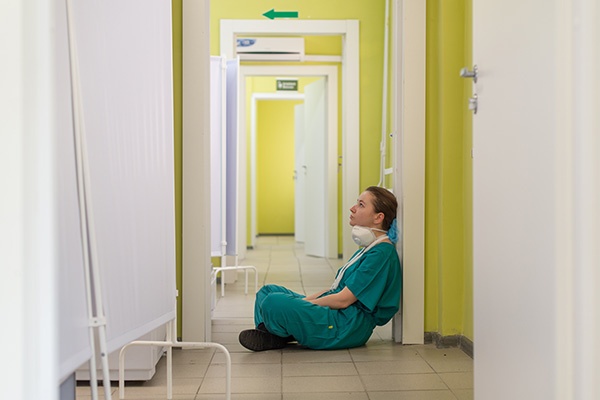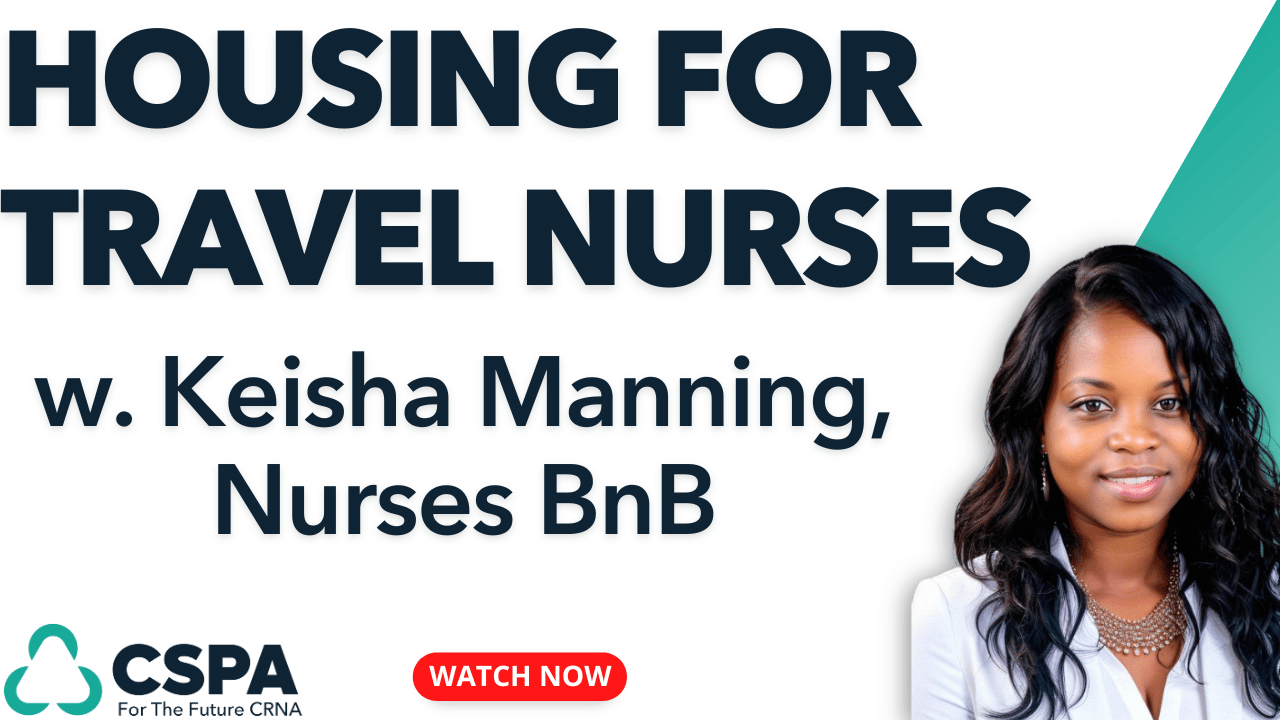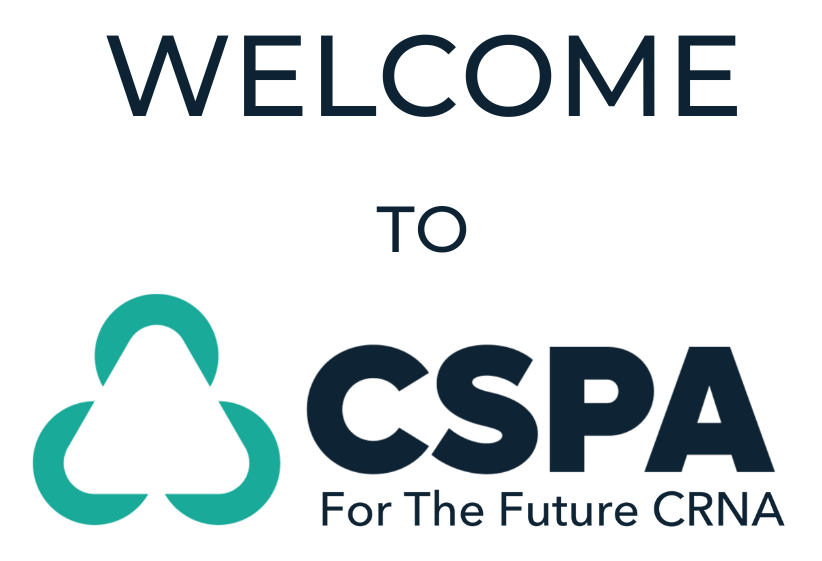
Get Your Free 8 Steps to CRNA Road Map Guide
How do I know that CRNA is the right path for me? Wherever you are along this journey, you’ve likely heard some sweeping proclamations about the CRNA career, both positive and negative. However, the most qualified person to make the decision to commit to becoming a CRNA nurse is YOU.
In this episode, we’re diving into the questions you should be asking yourself to figure out if CRNA is the career for you! So put on the blinders to what everyone else is saying, pop in your headphones, and tune in as we cover –
- The critical importance of starting to plan early, thinking “big picture,” and leaving the door of opportunity open to yourself (especially while in nursing school!)
- Why you should seek out as many shadowing and networking experiences as possible to immerse yourself in the CRNA world
- How “following your fear” can expand your comfort level and expose you to incredible growth and reward
- A realistic take on the different types of stress you can expect as a CRNA
- The personality traits and tendencies that will benefit you inside this field
- The incredible rewards that come along with the level of responsibility as a CRNA.
Happy reflecting, future CRNA! You’ve got this, and we’ve got you!
Wondering what kind of questions you may be asked in your CRNA interview? Grab your free copy of over 100 real CRNA interview questions! https://www.cspaedu.com/questions
Thousands of nurses have gained CRNA school acceptance with CRNA School Prep Academy. Join today for access to all of the tools proven to accelerate your CRNA success! Click here:
https://crnaschoolprepacademy.com/join
Join the CSPA email list: https://www.cspaedu.com/podcast-email
Join the Free Facebook Community here! https://www.facebook.com/groups/crnaschoolprepacademyfree
Book a mock interview, resume or personal statement critique, transcript review and more: www.teachrn.com
—
Watch the episode here
Listen to the podcast here
Is CRNA Right For You?
We’re going to talk about how to know you want to be a CRNA or what you should be asking yourself when questioning whether CRNA is the right career path for you. I have a lot of students who are early on in their journey and are still in nursing school and if you’re like me, you hear everyone talk, “That’s the best career in nursing. It is nursing anesthesia. It’s the cream of the crop. It’s the hardest, most competitive thing to get into. It’s the best.” I’ve heard a lot of those types of words being thrown around. However, when assessing whether or not you truly want to be a CRNA, I would put blinders on to that.
Assessing Your Own Path to CRNA
I wouldn’t say, “I know they make a lot of money. This must be the best. This is going to be the best career for me.” That’s a big perk. We do make good money for what we do, but there are a lot of other things to making money that comes with job satisfaction. I want you to put the blinders on as far as what everyone else is saying. Especially sometimes too, it can even be the naysayers meaning, “I heard you have to be a straight-A student to do that.” Blinders, don’t listen to that. “I heard that it’s super hard and it’ll wreck your life. You’ll get a divorce and all other things.” Blinders, you don’t have to listen to that. I encourage you when you’re assessing your own path and journey to take it from your own approach.
Don’t take someone else’s expectations, thoughts, or fears and apply them to your own situation. I encourage you to come up with your own thoughts and feelings around whether CRNA is for you. What I can tell you is that if you truly find this is the career path that you’re destined for and it speaks to your soul, you’re not going to let any of these roadblocks stand in your way.
You’re going to find a way to make it work. One of the most important pieces of this entire puzzle is to start planning early. The sooner you can start planning on making this a reality, meaning the sooner you can commit to becoming a CRNA, the easier your path is going to be. The reason for this is because you can miss a lot of detours or a lot of speed bumps along the way if you plan well for it.
You’re not going to have as much last-minute making-up to do. Probably one of the biggest mistakes I see students make and they say all the time was, “I thought nursing was my only thing. I was only going to get my Nursing degree and that was it for me. I didn’t want to go back to any more schooling. I was done with school. I didn’t think I wanted to pursue a higher degree.”
By having that mentality early on, you limit yourself and your possibilities. I’m not just speaking to CRNA. I’m speaking to any advanced practice role. If you go into your nursing career with the expectation “this is it for me”, you are closing the doors on so many opportunities for you later on. I promise you, life changes. Just because you think that way now does not mean that you will in ten years; you’re going to be a totally different person.
I can speak for myself many years ago, but I am way different now, not in a bad or good way. I’ve probably picked up some bad and good habits along the way. I’d like to think I’ve improved overall. I know maturity-wise, I improved. When I think back from the way I was in my twenties to the way I am now, what has improved the most in a positive way is that I’m way less selfish.

CRNA Career: The sooner you can commit to becoming a CRNA, the easier your path will be because you can miss a lot of detours or a lot of speed bumps along the way.
I don’t mean that in a mean way. Please don’t take that in a mean way. I’m speaking to myself thinking about what I cared about back then, it was a lot about what was for me. What I care about more now is what I do for others and what I provide for my family. What drives me more than anything is how I can provide for my family, who I am as a person, and how I show up for others.
Be In Tune With Your Needs
That takes selfishness. Don’t get me wrong. For you to show up for others, you have to be in tune with what you need for yourself. That is number one. Meaning if you don’t care for yourself, you will not be able to be there for someone else. If you’re an ICU nurse, you know this because you see families suffer in this realm. You see them show up for their loved one at the bedside and yet they haven’t showered and slept for a week; they can’t even emotionally be there for their loved one who’s critically sick because they have lacked self-care. You know how important self-care is.
I’m not saying at all, but I’m saying maturity-wise, I had a much more inward focus long-term than I do now. Don’t get me wrong, I still focus on myself, but my overall big picture is a lot more broad, spread out, and all-encompassing when it comes to looking at what I could do to make an impact in the world and what I want my legacy to be. What do I want people to remember me by? I want people to remember me for not just what I do for myself, but for what I do for them. That to me is making an impact. I didn’t even think that way when I was twenty. I don’t even know if I had the capacity to think that way when I was twenty.
I encourage you not to shut the doors early, to try your best to be a good student and learn early on how to be a good student because you never know where you’re going to be 10 or 15 years from now. You could totally take a different direction in your life altogether. I wanted to give you guys my mother’s spiel on that. That’s my number one piece of advice.
You don’t have to know CRNA is for you early on, but be open to the possibility such that you apply yourself in school to allow yourself opportunities for growth later on in life. It does not mean if that has already been your case or you already dug your hole, you can’t climb your way out because you sure can. I’m letting you know from experience the students that I see, that they’re great CRNAs and students.
The CRNA Shadow Experience
They just, unfortunately, didn’t have that direction or that guidance early on. It left them a much harder path to deal with later on when it came to pursuing CRNA. It probably applies to other advanced nurse practice roles. I want to make sure I give you that mother hen speech. How do you know CRNA is for you? This is an underlying question, “I’m interested. It sounds cool. I like all the autonomy they have and the pay is cool. They have a lot of respect. I want to do this.” How do you know you want to do this? I will say it until I’m blue in the face and I always encourage people to shadow. However, due to our circumstances with germs, and I’m not saying that lightly, don’t get me wrong.
I’m not undermining or underplaying the severity of this, but in general, with the way things are going, I don’t even like saying the word anymore because I feel like it’s taboo to ever say the word. You know what I mean when I say germs, but because of the way things are these days, it’s become extremely difficult to get that experience, which is upsetting and unfortunate. One of the best things you can do is try to put yourself in our shoes by watching us provide anesthesia.
If you can get a shadow experience, please do not give up on that attempt. Meaning if you’ve been turned down 3, 4, 5, 6, or 7 times to get a shadow experience, it doesn’t mean you should stop trying. It means to seek out other opportunities or whatever. Even if in a dental clinic or colonoscopy clinic, sometimes their regulations may be a little more lax because they’re not taking inpatients.
If you truly find a career path that speaks to your soul, you're not going to let any roadblock stand in your way. You're going to find a way to make it work. Share on XAt least that’s been my experience. Hospitals want to watch who they’re bringing in the doors for risk of exposure and things like that. If you have an outpatient facility where all their patients are going home anyways, they might be more apt to let you shadow in the OR. Seek out opportunities wherever you can. You can network within the community.
That’s a great way to try to open up some doors to get this opportunity. What I mean by that is going to various conferences at your state level or attending things like CRNA School Prep Academy Conference. Taking advantage of opportunities like that is a great way to network and meet other aspiring students. Even if there are other aspiring students, you don’t even have to know a current student.
If you know other aspiring students from other states and cities nearby, they may have a contact that they can share with you. Making this connection and network is vital to boost you along the way. Starting that early on, even if you’re still a nursing student is key to helping you as you progress down this path, but you need to get a grasp for what we do is what I’m ultimately saying by the shadow experience.
You don’t want to get into school, which is an amazing accomplishment and get through some of the didactics and be like, “I didn’t know we had to know all of this.” Maybe the didactics are okay or the actual educational aspect is okay, but then you get to the clinical and you’re like, “I had no idea that it was going to be this intense. This is not for me.”
I encourage you to get that shadow experience so you can physically see yourself in those shoes. I know for me, it pushed me to actually want this more because I got lit up and excited. I felt that fire in me like, “This is so cool. I want to be doing that. I need to be doing that. I need this to be my job. I will not stop at anything.” That’s how I felt when I was in that OR watching the CRNA do these things.
I wanted that to be me. I was scared. I was like, “Can I know all that stuff? Can I do that? Will I ever know how to mix up all those drugs and understand how to dose them all so quickly as they seem to effortlessly mix up Neo-Synephrine and push it?” They didn’t even seem to stress them at all. I remember being like, “Am I ever going to be that good? Will I ever be that good?”
Yes, you have plenty of education under your belt and experience to be that good. You will be comfortable as well. What’s beautiful about anesthesia is you’re always learning. You never stop learning. I encourage you. If you are a lifelong learner, if you like to be challenged in that way, you will enjoy anesthesia because it’s an active and mindful career. It’s not dull. It’s mentally challenging.
Even easy cases are mentally and physically challenging in the sense that you’re not doing backbreaking work, but you’re always on high alert. You’re always trying to stay one step ahead because even simple cases can go wrong and then you’re on; it’s game on. You’ve got to take care of the bleeding and stabilize the patient. You’ve got to create an airway.

CRNA Career: When you put yourself in more fearful situations, eventually, you become less fearful.
You can go from being 100% okay and smooth sailing to a quick disaster if you don’t intervene. That being said, you’re always on a little edge. If that is bothersome to you, I encourage you to get to the bottom of why that is. Can you put yourself in those types of experiences to get more comfortable? I will be honest with you guys, that fear of being that person in the room when the patient codes or being the person who has to clear the airway was terrifying to me.
I remember thinking, “I don’t know if I’ll ever be able to do that by myself.” What I did is I put myself in those positions, such as working in a critical care unit to be exposed to these critical situations where I watched nurses do this in the ICU as a nurse’s aide. I saw them come to the bedside when the patient coded or hemorrhaged out like a GI bleed. For example, I watched these nurses as a nurse’s aide, do these life-saving maneuvers as a nurse and then I became that as a nurse. I got experience doing that as a nurse.
Get Exposure to Nurse Anesthetists
When I first watched as a nursing student, the CRNA did a lot of these things- I remember thinking, “I don’t know if I’ll ever be able to do that.” If I put myself in a situation where I’m going to be uncomfortable, I will learn, and they had to do it that same way. They didn’t start off knowing how to do all these things. We’re not born knowing how to provide someone an airway or what drugs to mix up and how to dose them. We have to learn all those things. You are as capable of learning all those things as I a, as anyone else is. Give yourself that chance. Don’t talk negatively to yourself. That is going to be your biggest hindrance in life. You can be afraid.
It’s okay. Fear is not bad. Fear can make you vigilant. Think about it. If you’re training to jump out of a plane, you better make sure you’re vigilant because otherwise, you’re dead. If it’s life and death on the line, you make sure you follow the directions to the T. Our job can be high stress and it can be life and death sometimes, but it doesn’t mean it’s not enjoyable and you’re not perfectly capable of being trained and vigilant.
I asked you, is that something that you would feel comfortable with potentially after exposure? Don’t write it off. Get the exposure now. If you’re a nursing student, go work in the ICU and watch these ICU nurses. I’ll tell you a little story that I used to think ICU nursing could not be for me because as a nurse’s aide, I would occasionally float to the ICU unit.
Every time I did, I felt like I saw a horrific code that scared the living daylights out of me. One of them collapsed on me. I remember it was almost like PTSD. I don’t want anything to do with that, but here I am as a nursing student who went to the OR and I gravitate towards the head of the bed. I’m like, “That’s a nurse. Look what they’re doing. This is awesome. This gets me excited.” As a kid, I used to watch Discovery Health and surgery. Maybe I’m a little weird, I don’t know, but I never wanted to have my hands inside of someone’s body, but I liked surgery and the outcomes of surgery.
I like knowing that we could do all these crazy, amazing things for patients while they’re completely asleep and they don’t feel anything. It blew my mind. It was always fascinating to me. It intrigued me and interests me, “How does this happen? I want to know how this works.” I always had that, but I had self-doubt. I’m telling you and sharing this with you, because even if you’re early on, people limit themselves to possibilities by not doing things like job shadow, investing in the career path, going to conferences, and networking because in their mind, they think that maybe they’re not worthy and capable. They don’t even give themselves that chance. I’m telling you, please don’t do that. You can be fearful and scared.
Seek out opportunities wherever you can. Share on XAgain, put yourself in it or in more fearful situations. Eventually, they become less fearful. The more you jump out of a plane, the more it becomes second nature. You’re not as nervous. I’m sure you’re always a little nervous. I would be terrified to jump out of a plane and you will never catch me jumping out of the plane. I’m sure as heck I’ll provide anesthesia to any patient.
They could be hanging on by a thread and I’ll still provide their anesthesia if it means potentially saving their life. Put yourself in the position. I challenge you to be a little uncomfortable with this; to push forward with getting that experience and exposure because that’s going to be one of the best ways you can judge whether or not this is going to be something that you can see yourself doing.
That could be talking to a CRNA, reading episodes of my show, being a part of my Facebook community, being a part of CRNA School Prep Academy, getting your questions’ answers, and getting the mentorship you need to make that judgment call. I mentioned this before, but the high-stress nature of it. People are like, “CRNA is stressful.” Working in ICU is stressful as well.
If you can make do in the ICU, you’re going to be fine with anesthesia. I’d like to say my time in the ICU was a different type of stress than I experienced in school. The type of stress I experienced as a CRNA is a different type of stress than I experienced as a student. My stress in the medical ICU was different than the stress that I experienced as an anesthesia student, even more so different than the stress I experience now as a CRNA.
They’re all not fun. However, they’re all different and different for their own reasons. I can tell you right now that I can tolerate them all in different variations and different levels. The stress that I experienced in ICU was emotional stress. That was hard for me to actually cope with long-term because it ate at my soul. I had a hard time dealing with seeing all the death and suffering. I had a hard time coping. Looking back, I probably should have sought out some professional help, considering that that was one of the hardest times in my life to be working in the ICU and seeing people die all the time and feeling like I was part of their suffering. That was hard for me.
School was hard for me because of this mental and physical exhaustion and how can I learn all this stuff so quickly. My brain is going to explode and stress. Also, the performance stress as a student, you put yourself under so much pressure to perform good. If you even slightly vary, you beat yourself up. “I got a B-plus. I’m a failure. I shouldn’t be doing this. I’m terrible. I missed my intubation for the second time in a row. I couldn’t get my A-line for the fifth time, the fifth day in a row.” You beat yourself up over silly things in the big scheme of things. The performance pressure is real. On top of the academic stress and the clinical stress, it can take a toll on your overall physical health if you don’t have good coping mechanisms in place.
Stress as a CRNA is different. For me, when I first started, it was like, “I’m on my own. Are you sure you want me to go in this case? Be on your celly. I’m going to give you a call if I need you,” but it was okay. It’s funny. I remember telling myself, “Jenny, you’ve prepared for this for over two years. You’re fine. You know what to do and think. If this happens, then what? Plan for the worst. Hope for the best. Always be prepared. Try to do as good of an assessment as you can to anticipate what the patient’s needs are. You’re okay.” I remember I had to talk to myself like that for a while when I was brand new.
I remember they approached me to join the open-heart team after six months of experience and to do OB overnight when there were pretty much only two other providers in the entire level one trauma hospital. I’m like, “Are you serious? I only have less than six months of experience as a CRNA.” I remember the CRNA that told me this was like, “You’ll hit the ground running. You’ll be fine.” I’m like, “He’s right.” The more you put yourself in these uncomfortable situations and force yourself to do something even if you’re a little fearful, you will learn quickly. I did, I put myself in that situation.

CRNA Career: You learn from your experiences and then build upon those experiences to learn more.
I learned. I loved open-heart anesthesia and doing OB. Love and hate, I should say. I liked OB when it was great, but it was also one of those things where sometimes it wasn’t so great. It was a great experience. It helped me get more comfortable with my own skill set quickly. The stress of being a CRNA is more about the fear of the unknown, never experiencing this before, and being the person that people turn to, know what to do, be at the head of the bed, essentially know how to delegate and tell people what you need and want from them to help the patient. Remember, it’s a team effort. You have your surgical team, attending, and other CRNAs. You have support.
You’re never truly by yourself. You could be the only anesthesia provider in the building that can exist. That being said, that’s a big responsibility, but you can mentally prepare for that by making sure that you’re vigilant, you take it upon yourself to always be a learner, you know what you’re doing, and use your resources. You will always have resources, whether that’s a textbook, an app, call a friend, or whatever.
You’re truly never doing anything by yourself. You’re always going to have some type of resource available to you. Whether that’s even a textbook or messaging a friend or a coworker. If you’re the sole provider, consult someone outside of the hospital if you have something that’s coming in that something you haven’t dealt with before.
Building Skills on Your Way to CRNA
The only way to build skills is to do them. The more you put yourself in positions where you maybe are uncomfortable, that’s okay because you’re going to build your skills that way. You’re going to learn from all your experiences and then build upon those experiences to learn more. That’s how learning works. You don’t always go into everything and know everything, but when you expose yourself to learning, you do pick up things and you build on old knowledge. If you continuously do that, there’s no limit to what you can learn. Being a lifelong learner is something that CRNAs do possess in them. The ones who thrive in this career love learning. They do love Pathophysiology and Pharmacology.
I don’t think I’ve ever met a CRNA who literally says, “I can’t stand Pharmacology or Pathophysiology.” That’s a big part of what we do. If you physically hate it, not in the sense that it’s hard. You can like something that’s hard. Just because Pathophysiology and Pharmacology are hard for you, it does not mean you’re not capable of doing them. It’s hard for everyone. It’s not easy. It’s a big concept to grasp. I don’t like history and writing. I don’t even enjoy the act of doing it. The act of trying to learn history is dull to me that it goes in, then right out. I don’t care. I don’t have any interest in it where the Pathophysiology and Pharmacology are hard and challenging to learn, but it interests me because it’s like, “That’s how that works? Awesome.”
It excites me to learn about it, even though I’m at a prime to get this in 2 seconds and have to re-read it 10 million times. I enjoy learning it 10 million times because it interests me. That’s what I mean. Don’t be fearful of, “I have to be a rock star in Chemistry.” I got a C in Chemistry in college. It was probably the hardest class I’ve ever taken in college. You don’t have to be a straight-A student in some of these hard courses. You have to want it and like it enough to be able to apply yourself to take on the workload that you’re going to experience in school.
Teamwork as a CRNA
Something else too is teamwork. You will be in the OR by yourself a lot. It’s not the same as working in ICU where you’re always around your coworkers all the time. You may only see your coworkers intermittently on lunch breaks or in a hallway, honestly, but you still work with either an attending or your model is a supervision model. Maybe you occasionally see you are attending in the preop or whatever. You’re still going to have teammates there. You’re still going to have people there that you interact with. You’re still going to have someone to phone a friend for some help. You’re still going to have teammates. It’s a team effort.
You have the other anesthesia provider that’s going to be in the building with you, but you also have your surgical team. That’s part of teamwork. You have to communicate. Communication is big. You have to enjoy doing that. If you think like, “I don’t want to talk to anyone all day. I want to sit in my little corner and be completely unbothered,” you have to not mind communicating.
The only way to build skills is to do them. Share on XNot in a sense that you have to jibber-jabber the whole time. In fact, that’s not good because if you jibber-jabber the whole time, you will not pick up on cues for your patient. You need to be more observant and listen than you do to talk. I’m saying you have to at least enjoy engaging with others in the sense that you’re working together as a team to accomplish one goal, which is to care for your patient, which again you do as a nurse.
I’m pointing out there that if you’re cool with the way nursing works, you’re probably going to be cool with how anesthesia works. It’s something to think about, especially if you’re early on in this whole thought process. The responsibility, no one takes this job because they love the stress of responsibility, but it’s the rewards that come with the responsibilities such as being able to make someone not even know they’re having surgery.
How rewarding is that when you wake them up and they say, “When are we going back for surgery?” You’re like, “We’re already done.” That’s rewarding to be able to know that you’re bringing that comfort and that they’ve gotten through this procedure safely and painlessly essentially. That’s a lot of responsibility, but it’s rewarding knowing that you’re making a difference in that person’s life and that you’re saving someone’s mother, sister, or child.
You’re making a big impact. That part is rewarding. The responsibility and the stress of it can be obviously stressful. The good has to outweigh that. The goodness that comes out of that responsibility has to outweigh the fear of that responsibility. If you’re going to be paralyzed in fear, because now you’re calling the shots, this is back to putting yourself in the position to experience those things before you rule it out for you. Take on responsibility roles in your hospital and see how you do and like it. Don’t go into this blind with literally no experience. That’s partially why you need the ICU experience because part of the ICU skills is to be someone who’s in a higher high responsibility role in providing patient care and also dealing with patients who are sick.
Being a CRNA Nurse is Hands-On Work
Also, one other thing I want to point out and it probably sums up the most of it is hands-on. There are things you don’t have to always be hands-on. You can still be a CRNA and do education or work. Maybe get more involved with politics and get more politically involved like the ANA. There’s a whole bunch of things. There are pain management clinics where you do pain injections. There are ketamine clinics. There are anesthetics where you do plasma, facials, Botox, and stuff like that. There’s a wide scope that CRNAs do. It’s not just all sick hospital patients. It’s a lot of hands-on work. If you like hands-on work, meaning physically doing tasks, then this is a good career path for you. That’s something to keep in mind.
There are other avenues. There are a lot of educators who maybe don’t spend as much time in the clinical realm, but enjoy more of the teaching. Same with being politically involved. Maybe they’re not in the OR all the time, but now they run an anesthesia business. They have an entire surgical site that they run and manage, they’re more in that manager role and they don’t spend as much time in the OR administering anesthesia.
There are ways to find your little niche within the field, whatever fits you. I encourage you to ask yourself, “Do I enjoy being hands-on?” A good chunk of what most CRNAs do is hands-on work. That sums up how to decide if CRNA is right for you, but keep in mind the biggest piece is throwing yourself into our world and trying to gather an understanding of yourself as far as what our day looks like.
CRNA School Prep Academy has a virtual shadow experience that I highly encourage you to check out. Reading this, tuning in, and learning different topics I address and talk about is a good way to get all this information. I hope that this helps you guys to decipher through some of this confusion. Never shut the doors on yourself. Give yourself that chance. Put yourself in those uncomfortable positions. You will only thank yourself later, I promise. I hope you guys have a good rest of your day. Until the next episode, we’ll see you later.
Important Links
- Free Interview Practice Guide: https://www.CSPAEdu.com/Questions
Thousands of nurses have gained CRNA school acceptance with CRNA School Prep Academy. Join today for access to all of the tools proven to accelerate your CRNA success! Click here:
https://crnaschoolprepacademy.com/join
Join the CSPA email list: https://www.cspaedu.com/podcast-email
Join the Free Facebook Community here! https://www.facebook.com/groups/crnaschoolprepacademyfree
Book a mock interview, resume or personal statement critique, transcript review and more: www.teachrn.com









